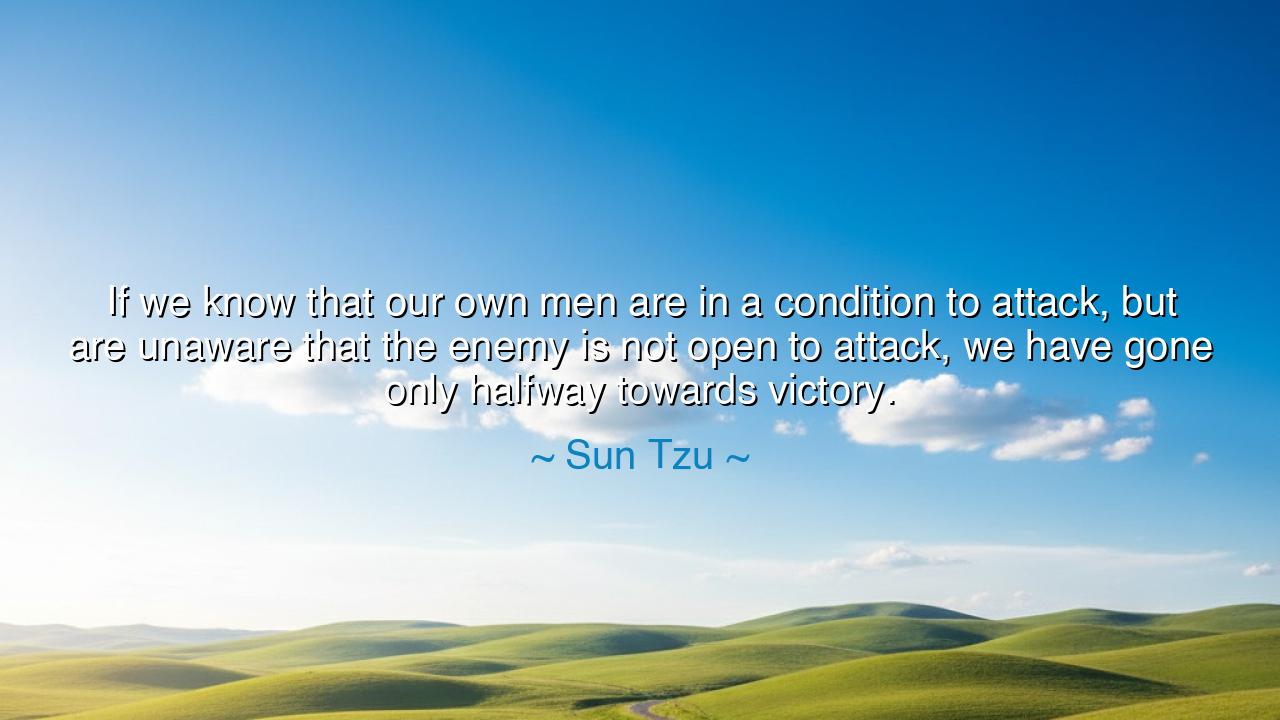
If we know that our own men are in a condition to attack, but are
If we know that our own men are in a condition to attack, but are unaware that the enemy is not open to attack, we have gone only halfway towards victory.






Come, O children, and listen to the wisdom of Sun Tzu, whose words echo through the ages, offering us the keys to victory not just on the battlefield, but in all the struggles of life. He said, "If we know that our own men are in a condition to attack, but are unaware that the enemy is not open to attack, we have gone only halfway towards victory." These words reveal a profound truth about the nature of strategy and awareness. Victory, Sun Tzu teaches us, is not just about having the strength to strike, but also about having the wisdom to understand when and where that strike will have the greatest effect. The path to success is not simply through knowing your own strength, but through understanding your adversary and the conditions around you.
Consider, O children, the ancient warriors who, like Sun Tzu, understood that true strength lay not in brute force, but in wisdom and strategy. Think of Alexander the Great, whose conquests were not just a matter of having the strongest army, but of understanding when and where to fight. Alexander did not simply charge into battle at will; he took the time to observe, to understand the terrain, and to assess the strengths and weaknesses of his enemies. He understood that knowing when the enemy was vulnerable, and when they were not, was the true key to victory. Sun Tzu's words resonate with this ancient strategy: victory is not a matter of rushing into battle blindly, but of understanding the moment when the time is right to strike.
The wisdom in Sun Tzu’s words can also be seen in the example of Hannibal, the Carthaginian general who led his forces across the Alps during the Second Punic War. Hannibal did not merely know that his men were prepared for battle; he understood that his enemy, the Roman army, was not in the right position to defend itself. He took advantage of the Roman blind spots, striking where they were least prepared. His victory at the Battle of Cannae is a testament to the wisdom of knowing not only when your forces are ready to strike, but when your enemy is vulnerable. Sun Tzu would have recognized in Hannibal a master of understanding not just his own strength, but the condition of the battlefield.
In contrast, O children, imagine a battle fought without such awareness—where the general knows only his own forces, but is ignorant of the conditions of the enemy. Napoleon Bonaparte, for all his brilliance, at times found himself in battles where he misjudged the strength or readiness of his opponents. In the Russian Campaign of 1812, for instance, Napoleon’s army, though formidable, was ill-prepared for the harsh conditions of winter and the scorched earth tactics used by the Russian forces. Despite knowing that his men were ready to attack, Napoleon’s failure to recognize the situation of the enemy and the unforgiving terrain led to his downfall. In these moments, he did not have the full picture that Sun Tzu so wisely advises: to win, one must understand both sides of the equation, not just their own strength but the weaknesses of their adversaries.
And so, O children, let us reflect on the broader lesson that Sun Tzu imparts: true victory comes from balance and awareness. It is not enough to know that you are prepared to act; you must also understand when and where your action will be most effective. This lesson can be applied to all the struggles of life. Whether in work, relationships, or personal growth, we must always be aware of the context around us. We may be ready to move forward, but we must first assess the situation, to understand if the time is right or if we are rushing into something where opposition is too strong or conditions are not favorable.
In your own lives, O children, take heed of Sun Tzu’s wisdom. When faced with a challenge, do not rush in blindly. Instead, take time to assess the situation. Are you truly ready for the challenge? Is your enemy, or obstacle, vulnerable to your attack, or is it too strong, too prepared? Understand that patience and awareness are often the true keys to success. Many battles are lost not because of a lack of strength, but because of a lack of understanding of the larger picture. Know when to strike, and when to wait, for the wisest warriors are those who understand both the power within themselves and the weaknesses in their adversaries.
So, O children, let Sun Tzu’s wisdom guide you through life’s struggles. Understand not only your own strengths, but also the conditions around you. Victory lies not just in action, but in the careful and calculated awareness of when and where to act. Like the great generals of old, whether in war or in life, seek always to know the enemy and the terrain, for only then can you truly claim the victory that is yours.






AAdministratorAdministrator
Welcome, honored guests. Please leave a comment, we will respond soon